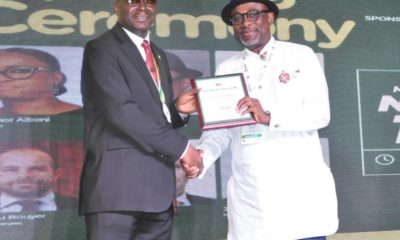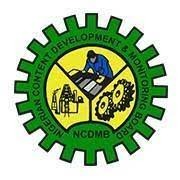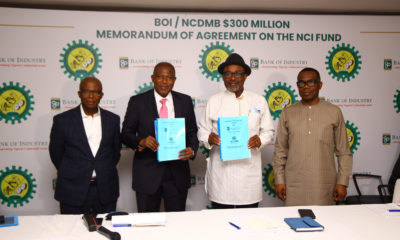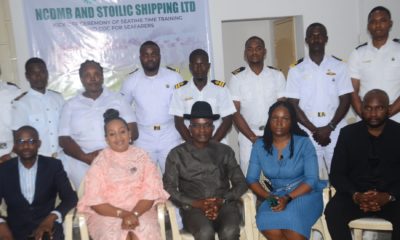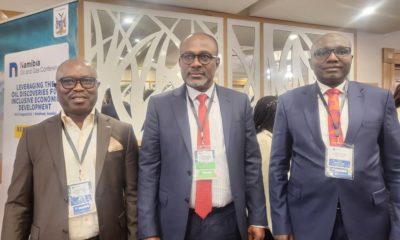Energy
NCDMB boosts technology-enhanced learning in Akwa Ibom, commissions three ICT Centres

In a deliberate effort to deepen Internet penetration and digital education in the country, the Nigerian Content Development and Monitoring Board (NCDMB) on Tuesday commissioned three state-of-the-art Information and Communication Technology (ICT) Centres, with dedicated broadband Internet, in three rural secondary schools in Akwa Ibom State.
The benefiting institutions are Girls High School, Ikot Ibiok, Northern Annang Secondary Commercial School, Utu-Etim-Ekpo, and Government Technical College (GTC), Ikot Uko-Ika. For each of the schools a dedicated block, fully air-conditioned and well-secured with protectors and reinforced metal windows, serves as the ICT Centre.
Each of the Centres has 31 units of desktop computers, 31 purpose-built desks and 31 seats, two stools, 25 solar panels (already installed), two 20kVA inverters with 30 pieces of battery, a 20kVA generator, a server unit, a printer and a scanner, a router and a dish for Internet services, and a giant smart screen display board with vast teaching and learning potentials.
They represent the latest in the initiatives of the NCDMB in capacity building, with over 15 million training manhours already recorded in diverse skills acquisition and empowerment programmes since the Nigeria Oil and Gas Industry Content Development (NOGICD) Act, 2010, came into effect. Many of the 13,000 beneficiaries so far have become successful professionals and entrepreneurs in the industry and related sectors of the economy, including the maritime.
The Executive Secretary, NCDMB, Engr. Simbi Kesiye Wabote, told Management and staff of Girls High School that the mandate of the Board centres on local capacity development and that it has a deliberate policy to make students familiar with digital tools for learning as a way of enhancing their competitiveness as they progress in education. According to him, the policy is “catch them young,” which means stimulating their interest in the sciences and engineering at an early age so they could pursue careers in those disciplines as they grow up.
In pursuit of that policy, he explained, the Board is also deliberately promoting science, technology and mathematics (STEM) education in secondary schools across the country to guarantee the development of indigenous manpower to secure the future of the country’s oil and gas country.
The NCDMB boss, who was represented by the Board’s General Manager, Corporate Communication and Zonal Coordination, Mrs. Angela Okoro, said the ICT Centres would make it possible for the students to have access to the current state of knowledge in all subject areas, as the smart screen and dedicated broadband Internet provide access to the latest publications and research results. The Centres also guarantee recognition by the West African
Examinations Council (WAEC) for teaching of ICT-related subjects and the students would be able to prepare and sit for various external exams.
In his own remarks, the NCDMB Zonal Coordinator for Akwa Ibom and Cross River States, Mr. Uduak Obot, said, “It is a thing of joy to start a thing and complete it,” recounting how work on the ICT Centres began few months ago and had thus far been completed. He thanked the principal and staff of the school as well as the contractor of the project for their efforts and quality work.
He told the students that “the oil and gas industry is knowledge-based” and that they “must be ICT-savvy” to be sufficiently competitive in that sector. The ICT Centre, he emphasised, elevates the standard of the school, and children of the masses now have access to digital tools that only their counterparts in the expensive private schools have been enjoying over time.
According to him, the dedicated broadband Internet now provided “will enable students to read any book anywhere in the world,” a fact that makes the facility a library of an advanced nature. Their studies would no longer be hampered by lack of money to buy books or non-availability of required texts from local bookshops.
His charge to the Management and students of the school as well as the host community: “Take full advantage of the facilities; take ownership,” adding: “NCDMB will be checking on the Centre from time to time.” He assured the school that experts would soon be sent by NDCMB, to train all the teachers on how to use the smart screen provided.
The principal, staff and students as well as the Ikot-Ibiok community thanked the NCDMB profusely for establishing such a Centre at their school, assuring the Board that they would ensure the safety of the facilities. A spokesperson for the community, Obonganwan Ekaette Nduese Essien, wife of a former Minister of Lands, Housing and Urban Development, said the commissioning was a historic development for the community as it had raised the standard of the school.
The octogenarian recounted how girl-children of the community had been so disadvantaged in the past, without opportunity for secondary school education, until the establishment of the Girls High School. The ICT Centre, she enthused, means young girls would be able now to get the best education without having to travel to distant places..
At Northern Annang Secondary Commercial School and the Government Technical College, NCDMB restated its history and mandate, and explained the importance of the ICT Centres donated to the schools. The Managements of the schools, students and communities were equally appreciative and wished the NCDMB success in all its endeavours. They all promised to protect the facilities.
Other Management staff of the NCDMB at the events included Engr. James Eyefigha (Zonal Coordinator, Edo/Delta), Dr. Emmanuel Ohanyere (Zonal Coordinator, Imo/Abia), Mr. Dala Asangolo (Zonal Coordinator, Rivers/Bayelsa), and Mr. Joseph Adebayo, Project Manager/Zonal Coordinator, Headquarters).
Energy
SNEPCo, Former MD Aiboni Win Energy Times’ Awards

The Shell Nigeria Exploration and Production Company (SNEPCo) has been named Major Oil Company of the Year for last year by a Nigerian publication, Energy Times.
Biztellers reports that this is in recognition of the company’s contributions to deep-water oil and gas development and the industry generally.
Energy Times also awarded the title of Amazon of Nigeria’s Oil Sector for 2024 to Elohor Aiboni, a former Managing Director of SNEPCo now on international assignment in Brunei.
The awards were presented to SNEPCo’s Senior Operations Manager, Bolanle Odunayo-Ojo, who represented the Managing Director, Ronald Adams at a ceremony attended by key stakeholders in the oil and gas sector.
ALSO READ: BREAKING: Again, Dangote Cuts Petrol Price To N835 per Litre
“We are honored to receive the recognitions for the company and our former Managing Director as they underscore our dedication to excellence in the upstream sector,” Bolanle stated. “The modest achievements are result from teamwork and support by our partners, particularly the Nigerian National Petroleum Company Limited and regulatory agencies. The awards encourage us to continue to work together to power progress and innovation in Nigeria’s energy landscape.”
The SNEPCo has been a pioneer in Nigeria’s deep-water oil and gas production since it began production from Bonga in 2005, Nigeria’s first deep-water well. Gas from Bonga is also piped to Nigeria Liquefied Natural Gas Company Limited at Bonny Island. SNEPCo’s operations have led to significant discoveries, including Bonga Southwest in 2001 and Bonga Northwest, which began production on August 5, 2014.
In its award, the Board of Directors of Energy Times pointed to the continuing success of Bonga, notably production of the 1 billionth barrel of oil in February 2023 and the recent Final Investment Decision on the $5 billion Bonga North project.
The award on Aiboni’s highlights a career that has seen her serve in various business and leadership roles within and outside Nigeria. She was appointed Managing Director of SNEPCo in 2021 and led initiatives that deepened operational efficiency, local content development and social investment projects across the six geopolitical zones in the country.
Energy
Shell Commends Oloibiri Lecture Series As Platform For Change

Shell Nigeria Exploration and Production Company Ltd (SNEPCo,) one of the sponsors of the Oloibiri Lecture Series and Energy Forum (OLEF) has commended it as a platform for driving change in Nigeria’s energy sector through the discussions that centre on business performance, cost discipline and process simplification.
“This event is special to the Shell brand, not only because of the nostalgia of Oloibiri but the quality of discourse it has enabled in our sector over the years,” SNEPCO Managing Director Ronald Adams said in a goodwill speech delivered by General Manager, Wells and Geosciences Operations Joe Mordi. He said: “We are grateful to the Society of Petroleum Engineers and our host the Petroleum Technology Development Fund (PTDF) for another successful outing.”
Organised by the Society of Petroleum Engineers (SPE) Nigeria Council, the Oloibiri Lecture Series and Energy Forum began in 1991, in commemoration of the country’s first commercial oil discovery by Shell at Oloibiri, Bayelsa State, in 1956. Ronald said recent developments in the Upstream and Downstream sectors of the energy industry, including the $5-billion final investment decision by Shell in the Bonga North Deepwater project echoed the sentiments around the first oil discovery.
ALSO READ: No Safety Guarantee For Unscheduled Visitors To Benue – Gov Alia
He noted that, “These strides come with a commitment to excellence required of us – for stakeholders, colleagues, our country and indeed, future generations. The theme for this year ‘Driving energy sustainability through technology, policy and supply chain excellence’ reflects this commitment. The future is bright, and we have the opportunity to co-create it.”
Energy
NLNG Improves Nigeria’s Domestic LPG Supply Efficiency

In line with its continuous improvement culture, the Nigeria LNG Limited (NLNG) will be working closely with its stakeholders to improve operational efficiency in its domestic Liquefied Petroleum Gas (DLPG) supply in Nigeria.
According to a statement from its General Manager, External Relations and Sustainable Development, Sophia Horsfall, this was highlighted at an engagement session with stakeholders in Lagos.
It was gathered that the NLNG plans to enhance engagement and improve operational efficiency of its LPG supply through digitalisation of some of its processes which include a new platform designed to streamline regulatory processes, optimise risk management, and enhance the buyer experience. The platform will feature IT-supported relationship management, automated issue resolution, centralised real-time payments, and improved case management systems, ensuring a seamless supply process despite market shifts and external pressures.
ALSO READ: Ifon-Ilobu Crisis: Adeleke Assures Of Quick Restoration Of Peace
Manager, Commercial Contract Management, NLNG, Tolulope Longe, reiterated that the planned improvements will enable and consolidate NLNG’s resolve to delivering 100% of its LPG supply to the Nigerian market.
She said a strategic roadmap was in play to ensure the achievement of NLNG’s longstanding goals of LPG being accessible and available in the country, aligning with its vision of being a globally competitive energy company, improving lives sustainably. She also harped on the significance of these improvement initiatives and the Company’s push for LPG utilisation as a clean energy source alternative to kerosene and other fossil fuels
Longe noted that the Company remained focused on growth and sustainability of the LPG market by continuously enhancing its supply processes in collaboration with offtakers. She stressed NLNG’s commitment to collaborating with stakeholders to maintain pricing stability and long-term market viability. While acknowledging industry concerns, she noted the importance of operational efficiency in meeting market demands.
NLNG aims to strengthen stakeholder engagement and improve market efficiency in the LPG sector through enhanced customer interactions, minimised schedule disruptions, timely confirmations and deliveries, and prioritisation of customers with demonstrable capacity. As it adapts to market realities, NLNG remains committed to driving sustainability and delivering lasting value to Nigerians.

